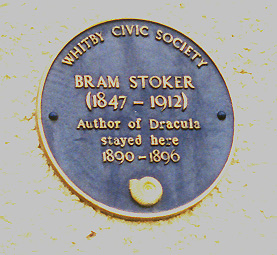Bram Stoker
Bram Stoker
Abraham "Bram" Stoker (8 November 1847 – 20 April 1912) was an Irish author, best known for his 1897 Gothic novel Dracula. During his lifetime, he was better known as the personal assistant of actor Henry Irving and business manager of the Lyceum Theatre in London, which Irving owned.
Early Life[edit | edit source]
Bram Stoker was born on 8 November 1847 in Clontarf, a coastal suburb of Dublin, Ireland. He was the third of seven children born to Abraham Stoker and Charlotte Mathilda Blake Thornley. Stoker was bedridden with an unknown illness until he started school at the age of seven, when he made a complete recovery. He was educated at Trinity College Dublin, where he graduated with a degree in mathematics in 1870.
Career[edit | edit source]
Stoker's early career included working as a civil servant at Dublin Castle and as a theatre critic for the Dublin Evening Mail. His reviews caught the attention of Henry Irving, a leading actor of the time, who invited Stoker to become his personal assistant and the business manager of the Lyceum Theatre in London. Stoker held this position for 27 years, during which he managed the theatre's operations and accompanied Irving on tours.
Literary Works[edit | edit source]
Bram Stoker wrote several novels, short stories, and non-fiction works. His most famous work, Dracula, was published in 1897 and has since become a classic of Gothic fiction. The novel introduced the character of Count Dracula and established many conventions of subsequent vampire fantasy. Other notable works by Stoker include The Lady of the Shroud (1909) and The Lair of the White Worm (1911).
Personal Life[edit | edit source]
In 1878, Stoker married Florence Balcombe, a celebrated beauty whose former suitor was Oscar Wilde. The couple had one child, Irving Noel Thornley Stoker. Stoker was a member of the Order of the Golden Dawn, a Hermetic society, and was friends with many prominent literary figures of his time, including Arthur Conan Doyle and Walt Whitman.
Death and Legacy[edit | edit source]
Bram Stoker died on 20 April 1912 in London, England. He was cremated, and his ashes were placed in a display urn at Golders Green Crematorium. Stoker's legacy endures through his influential work Dracula, which has inspired countless adaptations in literature, film, and other media.
Related Pages[edit | edit source]
- Dracula (novel)
- Henry Irving
- Lyceum Theatre, London
- Gothic fiction
- Vampire literature
- Trinity College Dublin
- Oscar Wilde
Categories[edit | edit source]
Search WikiMD
Ad.Tired of being Overweight? Try W8MD's NYC physician weight loss.
Semaglutide (Ozempic / Wegovy and Tirzepatide (Mounjaro / Zepbound) available. Call 718 946 5500.
Advertise on WikiMD
|
WikiMD's Wellness Encyclopedia |
| Let Food Be Thy Medicine Medicine Thy Food - Hippocrates |
Translate this page: - East Asian
中文,
日本,
한국어,
South Asian
हिन्दी,
தமிழ்,
తెలుగు,
Urdu,
ಕನ್ನಡ,
Southeast Asian
Indonesian,
Vietnamese,
Thai,
မြန်မာဘာသာ,
বাংলা
European
español,
Deutsch,
français,
Greek,
português do Brasil,
polski,
română,
русский,
Nederlands,
norsk,
svenska,
suomi,
Italian
Middle Eastern & African
عربى,
Turkish,
Persian,
Hebrew,
Afrikaans,
isiZulu,
Kiswahili,
Other
Bulgarian,
Hungarian,
Czech,
Swedish,
മലയാളം,
मराठी,
ਪੰਜਾਬੀ,
ગુજરાતી,
Portuguese,
Ukrainian
Medical Disclaimer: WikiMD is not a substitute for professional medical advice. The information on WikiMD is provided as an information resource only, may be incorrect, outdated or misleading, and is not to be used or relied on for any diagnostic or treatment purposes. Please consult your health care provider before making any healthcare decisions or for guidance about a specific medical condition. WikiMD expressly disclaims responsibility, and shall have no liability, for any damages, loss, injury, or liability whatsoever suffered as a result of your reliance on the information contained in this site. By visiting this site you agree to the foregoing terms and conditions, which may from time to time be changed or supplemented by WikiMD. If you do not agree to the foregoing terms and conditions, you should not enter or use this site. See full disclaimer.
Credits:Most images are courtesy of Wikimedia commons, and templates, categories Wikipedia, licensed under CC BY SA or similar.
Contributors: Prab R. Tumpati, MD





